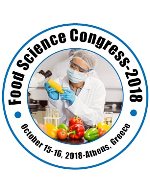World Food Science and Technology Congress
Athens, Greece

Reyhan Selin Uysal
Istanbul Gedik University, Turkey
Title: Determination of liquid egg quality using ATR-FTIR spectroscopy in combination with chemometrics
Biography
Biography: Reyhan Selin Uysal
Abstract
Liquid egg products as a substitute for shell eggs have been used in many food industries. Hence, determination of liquid egg (LE) quality has been an important concern for food industry. The aim of the present study was to determine the components of LE quantitatively within a very short time, where spectroscopic method was employed instead of reference methods. Compositional analysis (protein, lipid, moisture, and total soluble solid (TSS)) of LE samples was performed by ATR-FTIR spectroscopy. The actual protein (Kjeldahl method), total lipid (AOAC method), moisture (AOAC method), and TSS (Refractometer) content of the samples were detected by reference methods. Detected values were correlated with ATR-FTIR spectrum, and calibration models were constructed for each component to predict the content of the components. Data analysis was performed using partial least square (PLS) regression. The model performance was evaluated by the statistic RMSEC, RMSECV, RMSEP values and determination of coefficient (R2) value for calibration and validation data sets. The actual contents of the components were compared with predicted values. Determination of coefficients (R2) of validation data sets for protein, lipid, moisture, and TSS were 0.95, 0.992, 0.994, and 0.972, respectively. The error values, namely RMSEC, RMSECV, and RMSEP were obtained in the range of 0.404-0.978, 0.57-1.82, and 0.83-1.84, respectively. This study showed that protein, lipid, moisture, and TSS contents of LE samples could be estimated with a high accuracy using improved PLS models, which also contributes to the literature in the field of a rapid quantitative analysis with high success.

